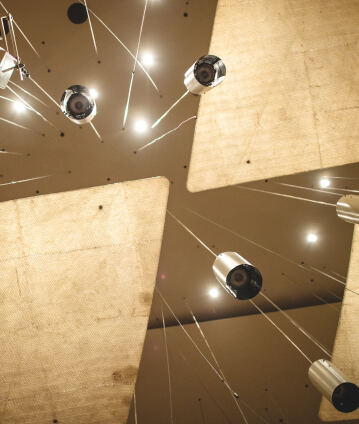Philharmoniker premieres: music of our time

In addition to the great works of the past, the Berliner Philharmoniker have always performed contemporary music. This playlist is therefore dedicated to Philharmoniker premieres and first performances and thus to the music of our time. Works by Wolfgang Rihm, Peter Eötvös, Kaija Saariaho and György Kurtág create a panorama of styles and fascinating sound experiments of the present.
Contemporary music is sometimes experienced as a challenge by performers and audience alike. However, familiarity with the music of one’s own time undoubtedly contributes to the vitality of an orchestra, and many instrumentalists and conductors stress the importance they attach to interaction with living composers. After all, while it is no longer possible to have discussions on questions of interpretation with Bach or Beethoven, such productive dialogues are possible with Thomas Adès or Unsuk Chin.
When the Berliner Philharmoniker were founded in the 1880s, many important composers of the late Romantic period were still alive. Some of them – such as Brahms, Dvořák and Tchaikovsky – performed with the orchestra themselves. This established a tradition that was also continued in the modern era. Among many others, Mahler, Stravinsky, Bartók and Prokofiev appeared with the Philharmoniker as conductors or soloists. And even today, the Philharmoniker’s collaboration with Peter Eötvös, John Adams or George Benjamin guarantees authentic interpretations.
In the course of their history, the Philharmoniker have premiered many great works. Sir Simon Rattle regularly commissioned new works during his tenure, and for the 2020/21 season, chief conductor Kirill Petrenko has programmed world premieres by Anna Thorvaldsdóttir and Andrew Norman – both of whom are represented in this playlist. Long-standing connections have also developed with Unsuk Chin, Kaija Saariaho, Magnus Lindberg and Brett Dean, who was a violist with the orchestra from 1985 to 1999. The assembled recordings also feature such outstanding soloists as pianist Emanuel Ax, violinist Isabelle Faust and singer Barbara Hannigan. Toshio Hosokawa wrote his horn concerto for the Philharmoniker’s principal horn player Stefan Dohr, and György Kurtág’s Stele ends the playlist. The piece, which can be heard here under the direction of Bernard Haitink, was first performed by the Philharmoniker and Claudio Abbado in 1994 and has since established itself as a central orchestral work.
Our recommendations
- Notturno: music of the night with the Berliner Philharmoniker
- Seiji Ozawa and the Berliner Philharmoniker
- The instrument in the centre: The viola in solo and orchestral works
- The “Late Night” concerts with discoveries for night owls
- The Berliner Philharmoniker play film music
- Our viola player’s perspective: Amihai Grosz’s favourites